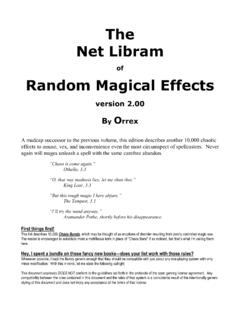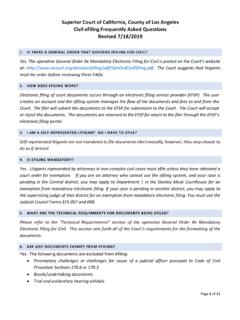Transcription of The Net Libram
1 The Net Libram of Random Magical Effects version By Orrex A madcap successor to the previous volume, this edition describes another 10,000 chaotic effects to amuse, vex, and inconvenience even the most circumspect of spellcasters. Never again will mages unleash a spell with the same carefree abandon. Chaos is come again. Othello, O, that way madness lies; let me shun that. King Lear, But this rough magic I here abjure. The Tempest, I ll try the wand anyway. Aramander Pothe, shortly before his disappearance. First things first! This list describes 10,000 Chaos Bursts, which may be thought of as eruptions of disorder resulting from poorly controlled magic use. The reader is encouraged to substitute more a mellifluous term in place of Chaos Burst if so inclined, but that s what I m calling them here. Hey, I spent a bundle on those fancy new books does your list work with those rules?
2 Whenever possible, I kept the Bursts generic enough that they should be compatible with just about any role-playing system with only minor modification. With this in mind, let me state the following outright: This document expressly DOES NOT conform to the guidelines set forth in the protocols of the open gaming license agreement. Any compatibility between the rules contained in this document and the rules of that system is a coincidental result of the intentionally generic styling of this document and does not imply any acceptance of the terms of that license. 2 What s changed in this edition? I ve made an effort to omit references to copyrighted materials, including proprietary spell names. Generic effects such as fireball or teleport still pop up in the list, but these effects are so commonplace in fantasy that no single source can truly claim ownership of them.
3 Over time it occurred to me that version includes hundreds of target-affecting Bursts very likely inappropriate and useless to gaming. Too many Bursts affect the target s spellbook or his familiar, or they involve subtleties of the target s perceptions; I concluded that most Bursts probably won t be triggered against magic-using targets, so any Burst that plays upon such a target would miss the mark. Also, since PC s don t usually have access to an NPC s thoughts, it would often be pointless to make the target think that he s directly in line for the throne (especially if the target is an orc or troll soon to meet his demise). Better to make the target-affecting Bursts more immediate or visible for the greater enjoyment of the players. Writing this edition, I deliberately included a handful of pop-culture references, in-jokes, and a few items of generic commentary.
4 In the whole list there are probably fewer than a dozen, so they shouldn t be a big deal during play. They re all still playable despite their subject matter, but if they really derail your game, then roll that Burst again. What hasn t changed? My wit remains just as dazzling, of course, and it shines from every single entry in the list. Beyond that, other features remain basically the same as in the original edition. Once again I have used the pronouns he, him, and his throughout the list, but this is intended to save space rather than as a commentary on sex as it pertains to chaos bursts. As before, one shouldn t infer a boys only attitude from this; female spellcasters can unleash chaos just as readily as their male counterparts. Another aspect that is largely the same is the description of area-affecting Bursts; the list still uses the terms nearby, here, in the area, and the like.
5 If a range is not specified, the Gamemaster should assume an arbitrary distance large enough to be interesting but not so large as to be world-shattering. Unless otherwise stated, all area-affecting Bursts should be assumed to originate from or center upon the intended spell s intended target point. The terms target point and spell s target point are used interchangeably. Why do Chaos Bursts happen? Some would suggest that casting a spell is analogous to going to a faucet for a drink of water. A conventional mage is like a normal person. He holds his glass beneath the spigot, turns on the tap, fills his glass to the desired level, and turns off the tap. Simple, efficient, and orderly. However, the wild mage doesn t work that way. Instead, he smashes the spigot with a hammer, tries to catch as much water as he wants in his glass, and then tries to reseal the ruptured faucet.
6 Complicated, inefficient, and chaotic. And very likely to get the wild mage soaked in the process. So it is with magic. Instead of opening a precise channel for magical energy, the wild mage tears a gaping hole in reality and hopes to get a particular effect. If he can reseal the hole, great. If not, the result is a Chaos Burst. What happened to the spell I tried to cast? In the previous edition I suggested that the intended spell be allowed to function unless directly contradicted by the Burst. I now feel this approach to be flawed and propose an alternative: the chance that a spell succeeds despite a Burst is equal to 10% per caster level minus 5% per level of the spell. Thus a 5th level mage who triggers a Burst when casting fireball has a 35% (that is, (5 x 10) - (3 x 5)) chance to succeed. Otherwise, the spell fails and is lost from memory. Feel free to devise similar methods as you see fit.
7 Can conventional mages cause Chaos Bursts? Sure! In addition to Wild Magic regions, normal mages can cause Bursts if they are disrupted during the casting of a normal spell. Though unlikely at low levels, higher-power spells can wreak havoc if not properly cast. To represent this, consider that a miscast spell has a percent chance equal to the square of one plus its level to cause a Burst. That is, a 1st level spell has a 4% (1+1) chance, but a 9th level spell has a 100% (9+1) chance. This can be modified by the mage s level or some similar value, as determined by the GM. Do I get a Saving Throw? This is up to the GM, but I d suggest against it for the most part. Unless the effect or the player s resultant griping will fatally disrupt the campaign, let the chips fall where they may. Most Bursts are, after all, reversible, so even the most cantankerous player could be soothed by an interesting quest to remove the Burst s effect.
8 Comparatively few Bursts cause instant death, so there is little to fear except inconvenience. If someone is expressly protected against an effect, like bursting into flame, then the Burst can be considered negated. 3 The description didn t give a duration. How long does the effect last? In general, if no duration is specified, then a Burst should be considered permanent until dispelled. Alternatively, it may be appropriate for a Burst to persist for as long as the intended spell would have done, or one round per caster level whichever is greater. A third possibility is to roll dice to determine the Burst s duration in turns, hours, days, weeks, or whatever. Yet another option is to assume that the Burst will last until some apparently random condition is met, (a brief list of possible conditions is provided at the end of this document). However, if a Burst has an explicit duration, then it should be assumed that nothing short of divine intervention or a full Wish can cancel the effect before that time.
9 Similarly, if a Burst has an instantaneous duration but a permanent effect, such as 1d10 of the target s fingers vanishing, then the effect can t be Dispelled per se; the target might be Healed, but there is no lingering magical effect to Dispel, so other remedies must be sought. As in the previous edition, any effort to dispel a Burst should be considered at least as difficult as an attempt to dispel magic cast by a mage twice the level of the caster who triggered the Burst. Also, it must be noted that many Bursts produce a beneficial effect in exchange for a heavy price; if the price is negated, then the benefit should also be negated. For example, if the caster becomes immune to disease by cutting off his thumbs, then he should lose that immunity if his thumbs are restored Some of these are cool, but some are just downright silly. What gives? That s how it goes.
10 The list is designed to add interesting elements to role-playing, not simply to blow the caster out of his boots or to turn the target into a puddle of goo. Sure it's nice that the target shrinks to 1/12 his height, but isn't it somehow more satisfying to have the caster think that all other magic users are out to get him? There are, to be sure, a bunch of powerful results, but these are ultimately less entertaining than the good role-playing required by some of the others. What about Bursts that just don t make sense? Effects with invisible or inappropriate results should be kept secret by the GM (at least from the characters) to preserve the mystery and danger of wild magic. If a fish has its feet enlarged or an aerial servant has half of its body turned invisible, the players should be told that nothing seems to happen. Such a statement could as easily mean a red dragon is now stalking the party but is not yet nearby.





